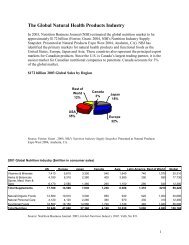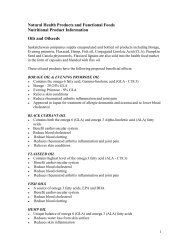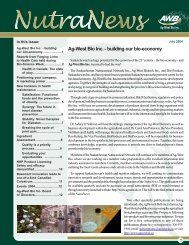Beyond Borders: Global biotechnology report 2010
Beyond Borders: Global biotechnology report 2010
Beyond Borders: Global biotechnology report 2010
You also want an ePaper? Increase the reach of your titles
YUMPU automatically turns print PDFs into web optimized ePapers that Google loves.
A closer look<br />
Reforming US health care<br />
In March <strong>2010</strong>, after many months of debate and controversy,<br />
health care reform legislation was finally enacted in the United<br />
States. The legislation — which aims to expand access to health<br />
care and boost efficiency in spending and delivery — promises<br />
over time to transform the US health care ecosystem.<br />
While final determination of how certain provisions are to be<br />
implemented will play out in the months and years ahead, it is<br />
clear that life sciences companies will soon face a significantly<br />
reshaped competitive landscape as a result of the legislation.<br />
While pharmaceutical and medical device companies will<br />
be significantly affected, the impact on the <strong>biotechnology</strong><br />
industry depends on a company’s stage of development. Large,<br />
commercial-stage enterprises will be more impacted by some<br />
of the funding mechanisms discussed below, while emerging,<br />
R&D-stage enterprises may benefit from R&D funding provisions<br />
included in the final law. Like companies in all industries, large<br />
biotech companies will also be affected by changes related to<br />
employment-based health insurance coverage.<br />
One of the primary goals of health care reform — expanded<br />
access to coverage — will be realized through a series of policy<br />
changes which will be implemented starting in 2014. These<br />
provisions include mandates requiring individuals to buy and<br />
maintain health care coverage and requiring most employers<br />
to either offer and contribute a minimum amount toward<br />
coverage for their employees or pay a new per-employee fee.<br />
The increased insurance coverage will boost demand for<br />
drugs. However, the increase in volume will be partially or<br />
12 <strong>Beyond</strong> borders <strong>Global</strong> <strong>biotechnology</strong> <strong>report</strong> <strong>2010</strong><br />
Connie Austin<br />
Ernst & Young LLP<br />
wholly offset by changes in payment mechanisms and levels,<br />
driven by increased coverage under Medicaid. The program<br />
is partially funded by an increase in Medicaid drug rebates<br />
and new annual fees and excise taxes on drug manufacturers<br />
and medical device companies. The impact on any individual<br />
manufacturer will depend on its product mix and whether<br />
expanded sales to previously uncovered patients will offset<br />
higher taxes and rebates. The potential returns on pipeline<br />
investments will be impacted by higher rebates. There is<br />
also a timing mismatch, since increased coverage will not be<br />
implemented for several years, while companies will see higher<br />
costs much sooner.<br />
Biotechnology companies will benefit from a biosimilars<br />
provision that gives new biologics a 12-year period of data<br />
exclusivity before they face direct competition. However,<br />
the FDA will still need to provide guidance to establish an<br />
abbreviated regulatory pathway for biosimilars. The final<br />
legislation also excluded two provisions that the industry had<br />
been concerned about: allowing US consumers to import<br />
drugs from abroad and letting the federal government<br />
negotiate drug prices directly with manufacturers.<br />
The increase in health care coverage creates new opportunities<br />
and challenges for companies. The real opportunity, though,<br />
is for companies to tailor their business models, processes and<br />
infrastructures to the needs of the new normal, where there will<br />
be increased focus on health outcomes.








